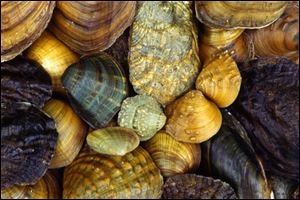
Freshwater mussels sought by poachers
5/16/2006A sharp-eyed policeman on the graveyard shift in Marietta, Ohio, helped put a halt to a sizable poaching operation involving biologically and commercially important freshwater mussels.
Three Tennessee men have been charged with an array of violations for taking 17 bags of mussels, weighing 1,763 pounds and including 2,386 individual mussels.

Freshwater mussels can range in size from a peanut weighing less than an ounce to a sheet of paper weighing several pounds.
Freshwater mussel shells are in demand for use in the international cultured pearl industry. Small beads are made from thick mussel shells and inserted into certain Pacific oysters to produce cultured pearls. It is illegal to take, possess, sell, barter, or trade any mussels or mussel parts in Ohio.
Charlie Stone, an investigator for Ohio Wildlife District 4 at Athens, gave this account of what went down:
Last Thursday about 4 a.m. a lawman on routine patrol in the Ohio River city was called to investigate a suspicious vehicle. While taking that call he noticed a man wearing a wetsuit next to a pickup truck in a hotel parking lot. As the policeman, curiosity aroused, approached, a second man ran into a hotel room and slammed the door.
The policeman observed bags of freshwater mussels stowed in the pickup bed and alerted Eric Bear, state wildlife officer assigned to Washington County. Presently state wildlife officers seized the mussel haul, the pickup and related equipment, and arrested three Tennessee men.
Those arrested were Kirk Benson, 34, and Larry Black, both of Camden, Tenn., and Tim Rutherford of Eva, Tenn. Each was charged with three counts of taking or possessing endangered species of mussels, a first degree misdemeanor, and one count each of taking mussels and transporting wild mussels possessed illegally.
Late yesterday they were held in Washington County jail in lieu of $20,000 bond, each, after entering innocent pleas to all charges. Preliminary hearings are pending. The maximum fine for a first degree misdemeanor is six months in jail and a $1,000 fine.
Wildlife officers and biologists worked quickly to count, sort and identify each mussel in an attempt to weigh the impact of the haul on the river's mussel population. Dr. Tom Watters, a malacologist or mussel specialist at Ohio State University, assisted the sorting and identified 14 of the mussels as endangered species.
All the mussels were returned to the river in hopes of saving those that still were alive.
While mussels are not cuddly creatures with eyelashes, they are very important to the web of stream life. They act as miners' canaries in a stream by detecting and filtering pollutants and toxic chemicals. They are a food source for other animals and an anchor for plants on the streambed.
Mussels are among the most endangered families of wild creatures in North America. They often are called clams even though they are not directly related to saltwater clams, oysterswith seafood lovers.
It is not the first time that southern Ohio streams have been targeted by mussel poachers. In 1998, for example, a Japanese-owned company in Tennessee was court-ordered to pay $1 million in restitution for buying thousands of pounds of mussels poached from rivers in Ohio, Michigan, West Virginia and Kentucky.
Stone said that the Muskingum is home to sizable quantities of many commercially desirable mussels species.
"Not all freshwater mussels are of commercial value" he said, adding that while markets fluctuate weekly, the market currently pays $1 to $1.50 a pound.
Shelling, as taking and processing mussels is called, is legal in some areas, and has provided up to 10,000 jobs, mostly in the Mississippi basin.
The primary species of interest in the Muskingum is the three-ridge mussel, Stone said. But the sorting by authorities revealed endangered specimens of at least three species: pigtoe, 9; sheepnose, 1; and washboard, 4. Many mussel species carry folksy common names that reflect an American pioneer heritage.
Prior to the 1800s, the Muskingum watershed supported at least 63 species of mussels, but today only 30 to 40 species survive, many of them endangered or threatened.
Mussels range from as small as a peanut to as large as a sheet of paper and weighing several pounds.
Shells from many species in Midwest streams are thick and large and can be turned into first class beads for pearl production. A bead is implanted in a live oyster and in turn acts as an irritant. The oyster in defense secretes nacre, a pearly substance to "wall off" the irritating bead. The larger the initial bead, the larger the resultant pearl.
The Buckeye Division of the $8.8 million Wal-Mart Bass Fishing League kicks off a five-event season on Saturday at Grand Lake St. Marys at St. Marys. A total purse of up to $45,000 is possible with up to 200 boat/co-angler team entries.
Call 270-252-1000 or visit www.FLWOutdoors.com for more details.